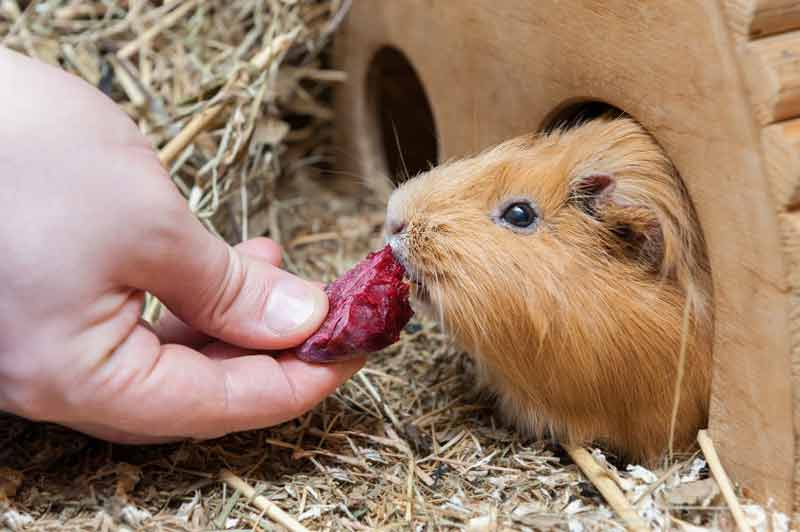I have noticed for a few days that my guinea pig’s bowls for water and food remain full every time I go for adding more. I waited for two days hoping that my guinea pig will start eating and drinking normally but in vain. If you are facing the same problem, you must also be anxious about your piggie. Don’t worry. This article will educate why your piggie is not eating or drinking. If you know the problem, you can quickly solve it.
If your guinea pig has stopped eating and drinking, you should find the cause of the problem. You should immediately consult your veterinarian for a proper diagnosis of the problem, and your piggie can be cured. After the treatment, you should focus on the diet and daily routine so that your piggie can regain the weight.
What you need to do is to keep a keen eye on your piggie to observe its routine. Notice any change in its behavior and eating routine. Then relate the below-mentioned conditions with your piggie, and you will be able to solve the issue.
Why Is My Guinea Pig Not Eating or Drinking?
There may be more than one problem why your piggie is not eating or drinking. The most common of all are GI tract issues, respiratory issues, and stress. However, other causes may include temperature fluctuations and changes in their habitat. A normal piggie can eat hay throughout the day along with some vegetables, pellets, and treats.
So, if your pet breaks the eating routine, you should be curious and observe him for one day. If your piggie doesn’t eat for one day and follows the same routine for the other day, bring him to your veterinarian immediately. He will identify the problems your guinea pig is facing.
Problems Causing Your Guinea Pig Not To Eat
Your guinea pig may be suffering from a disease due to which he has stopped eating and drinking. Following are the common problems guinea pigs suffer and break their eating routine.
- Long Teeth: Guinea pig’s teeth continuously grow, and when they grow too long, it becomes difficult to eat. Guinea pigs molars often grow inward and damage the gums and jaws. Therefore, you need to shorten their teeth regularly so that they can eat and drink easily. If you have not shortened them until recently, it may be the cause of breaking their eating and drinking routine.
- Tartar accumulation: Dental problems are one of the leading causes of breaking the eating routine. Guinea pig’s teeth develop dental tartar over the period, which may lead to many infections. Oral infection can be the reason for breaking the eating routine. Some diets prevent dental tartar from developing, or you should visit your vet for its removal.
- Gastrointestinal problem: Several problems occur in the gastrointestinal tract and slow down digestion activity. Once the digestion process slows down, your piggie doesn’t feel hunger and does not eat properly. Several bacterial and parasitic infections occur in the gut that may also slow down the digestion process.
- Vitamin C deficiency: Guinea pigs are unable to synthesize vitamin C in their body. Therefore, they need vitamin C in their diet. A required amount of vitamin C should be provided in their diet; otherwise, its deficiency causes lack of hunger, immobility, swelling, bleeding gums, anorexia, and weakness.
- Improper diet: An improper diet that does not contain an adequate amount of nutrients may lead to their lack of interest in food. Improper diet leads to weakness because it is not supplied with the essential nutrient it needs. As your guinea pig weakens, anorexia occurs, and they stop eating food. Therefore you should provide a properly balanced diet to your piggie.
- Respiratory infection: Respiratory infections are one of the most common causes because of which your piggie does not eat properly. Respiratory infections are everyday infections that your piggie can get easily. It leads to breathing difficulty, and in turn, your piggie’s activity will decrease. Hence, your piggie will lack interest in eating food.
- Emotional imbalance: It is sometimes hard to realize that your pet is facing an emotional imbalance. Yet, the emotional imbalance has a huge impact on your pet’s health. Your piggie can be disturbed because of several issues. There may be environmental stress, loud noise, change of habitat, change of diet, etc. all these factors lead to the secretion of negative hormones that affects eating and drinking routine.
- Stress: Large noise, environmental pressure, harsh conditions, etc., puts enormous pressure on your piggie. Your piggie can bear some of the pressure, but the problem occurs if it goes above the threshold. The first effect will be on a diet, and your piggie will lose interest in eating.
- Temperature fluctuation: If temperature crosses the adequate range, your piggie is not able to bear it. Survival is difficult in extremely cold and scorching temperatures. It puts pressure on your piggie, and your piggie’s eating routine would be the first to be affected.
- Surgical procedure: Surgical procedures result in pain; your piggie will not feel pain during the procedure because of anesthesia, but he will be in pain after the surgery. Due to pain, your piggie loses interest in food.
What Should I Do To Get My Guinea Pig Healthy?
First of all, you should eliminate the cause because piggies don’t break the eating and drinking routine unless ill. When illness is cured, you can focus on a healthy diet plan on the advice of your veterinarian that will help your piggie gain weight.
You can read it in detail on how to help guinea pigs gain weight. Here you will find everything about increasing the weight of your guinea pig.
If your guinea pig suffers from emotional disturbance, you should give him more time and care because all your guinea pig needs in emotional imbalance are your care and attention.

